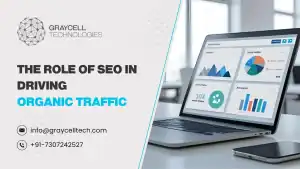Do you want to develop a digital marketing strategy?
Using the right elements and tools can help you manage your campaign effectively and get better results from your digital marketing.
In this post, you’ll discover what is Digital marketing, Why digital marketing, its tools, and the key elements of a successful digital marketing strategy.
What is Digital Marketing?
Digital marking is the online marketing of products, brands, and services by which we can reach consumers very easily or without wasting time. It is the best way to increase the popularity of any business and services. The main ingredients of a digital marketing strategy are SEO (Search Engine Marketing), SMO (Social Media Optimization) PPC and Email marketing, etc.
Earlier we used to focus on traditional marketing in which we have to move from door to door for product promotion which was a tough task. In this kind of marketing, there was a wastage of time, money, and energy. But digital marketing is just the opposite of traditional marketing.
Why Digital Marketing?
Digital marketing is very cost-effective as compared to traditional marketing. In traditional marketing, there is a lot of money wastage in printing banners, pamphlets, ads on TV, and all. In digital marking, you can grow your business easily and it is a more cost-effective channel that delivers results.
Some of the key reasons for using digital marketing:
• Very cost-effective than traditional marketing
• Digital marketing delivers conversions, and we can track these conversions easily.
• Through proper digital marketing channels and strategies we can generate better revenue
• Better interaction with targeted audiences as compared to traditional marketing
Elements of Digital Marketing Strategies:
Here are some important elements which are essential for the growth of your business.
• SEO (Search Engine Optimization):
It is a process of changing the position of your website or a web page in the search engine result page. There are two main factors involved in SEO given below:
• On-Page (Meta Title, Meta description, Meta keyword, etc.)
• Off-Page (video sharing, Content marketing, Link earning, slide share, infographic, popularity and all)
• SMO (Social Media Optimization):
Search Marketing Optimization / SMO plays a vital role in increasing the awareness of a product, brand or event through a number of social media platforms which include RSS feeds, social news and bookmarking sites, as well as social networking sites, such as Twitter, and video and blogging sites.
• PPC ( Pay per click):
Paid Search, PPC, or pay-per-click is an advertising model in which the advertiser has to pay the publisher when the ad is clicked. It is defined simply as “the amount spent to get an advertisement clicked.” These paid advertisements are placed above, or to the right of the ‘organic’ search results, and can cost a small amount of money depending on the competition of the keyword you’re bidding on.
• Email Marketing:
Email marketing is one of the important elements of digital marketing. You can easily and quickly connect to the targeted list of people without the need for large quantities of print space, television, or radio time or high production costs.
• Content Marketing:
Content marketing is a strategic marketing term focused on creating and distributing valuable, relevant, and consistent content to attract and retain a clearly defined and targeted audience. In order to successfully manage your content marketing effort, you need to give some time, effort, and dedication.
Tools used in Digital Marketing:
• Google Keyword Planner:
The best tool for keyword research available in the market. You need a Google Ads account to access it. This tool is mainly designed for paid searches, but we can also use it for SEO keyword research as well.
https://adwords.google.co.in/KeywordPlanner
• Webmaster (Search console):
Google Search Console (previously Google Webmaster Tools) is a web service by Google for webmasters. Google Webmaster Tools helps the website owner to identify the website issues and can even let you know if it has been infected with any malware.
• Google Analytic:
Is a freemium web analytics service offered by Google that tracks and reports website traffic. By using Google Analytics you can easily check the data of your website and check where the traffic is coming from, which keyword the user’s type and how they come into your website.
https://www.google.com/analytics/
• Facebook:
Facebook is a popular free social networking website that allows registered users to keep in touch with friends, post photos, share links and exchange other information
• LinkedIn:
Very interesting tool for B2B marketers, LinkedIn is the one-stop-shop for all businessmen and women and their companies. Great for audience targeting and contacting employees in specific positions.
• Twitter:
To build brand awareness, Twitter is the perfect tool. Use it to promote blog content and post relevant industry related news, as well as make use of the unique hashtag feature to reach a wider and interested audience.
• Blogs:
WordPress, Tumblr, Blogger, whichever platform you prefer, blogging is ideal for promoting products and services in an indirect way, and endorsing brand awareness to a new audience by using fresh content and SEO/keywords.
“Digital Marketing Optimization” – Data Points:
• Improve your Site Speed (Page Load Time)
• Make SEO-friendly URLs
• Design your website as per the SEO Standards
• Create and maintain accounts at popular social media sites.
• Boost your social media engagement
• Engage with your followers.
• Use Google Ads for advertisements.
• Regularly create blogs post with simple and unique content, images, and decent quotes related or relevant to your business.
• Choose the right time of the day for posting blogs and posts.
• Use # tags and @username (mention) in your post.
• Use your Facebook fan page to promote key content of your website
• Follow Google rules and don’t use the wrong way to get higher rankings in the search engine result page.
• Create relevant and natural links.
• Use a Proper Title, description, and keywords that have a sense and relevance to your business.
• Be sure you have a unique, keyword-focused title tag on every page of your site.
• Use ORM Online Reputation management which helps in removing your negative reviews and links.
• Use a local business or local listing.
• Make a single URL for your website or web page.
• Take advantage of the tools the search engines give you. E.g. sign up for Google Webmaster Central, Bing Webmaster Tools.
• Focus on search phrases, not single keywords.
Conclusion:
Digital marketing helps to boost your brand, product, services, and business in a short time and it is the best platform to broaden your networks.
If you are looking for Digital marketing services, our digital marketing team can help you to develop and implement digital strategies in SEO, PPC, Social Media, or ORM services.
Get in touch with us, and we’ll be happy to help you!








